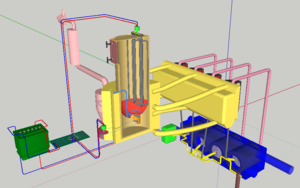A electricity generator, electrical generator, engine-generator, generator-set or gen-set is a device that converts mechanical energy into electrical energy (electricity), generally using electromagnetic induction (by means of a alternator or dynamo). The source of the mechanical energy used to generate the electricity may be a heat, pneumatic or electric motor, a wind turbine, human or animal labour, the sun, or the ocean.
The reverse conversion of electrical energy into mechanical energy is done by a motor. A heat engine and alternator/dynamo assembly that is also used to provide heat (for space heating) is called a "combined heat and power system".

See also[edit | edit source]
- Improving system efficiency by combining engines
- Appropriate technology#Energy
- Rural Electrification Systems
- Compressed air energy storage and use system
- Human powered electricity generator
- BioLite Home Stove and BioLite Camp Stove